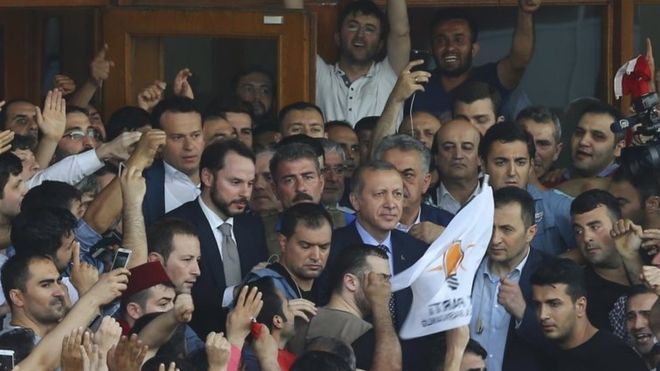AhlulBayt News Agency - Forces loyal to Turkey's government fought on Saturday to crush the last remnants of a military coup attempt which collapsed after crowds answered President Tayyip Erdogan's call to take to the streets and dozens of rebels abandoned their tanks.
More than 160 people were killed, including many civilians, after a faction of the armed forces tried to seize power using tanks and attack helicopters. Some strafed the headquarters of Turkish intelligence and parliament in the capital, Ankara, and others seized a major bridge in Istanbul.
Erdogan accused the coup plotters of trying to kill him and launched a purge of the armed forces, which last used force to stage a successful coup more than 30 years ago.
"They will pay a heavy price for this," said Erdogan, who also saw off mass public protests against his rule three years ago. "This uprising is a gift from God to us because this will be a reason to cleanse our army."
One government minister said some military commanders were still being held hostage by the plotters. But the government declared the situation fully under control, saying 161 people had been killed and 2,839 had been rounded up from foot soldiers to senior officers, including those who had formed "the backbone" of the rebellion.
A successful overthrow of Erdogan, who has ruled the country of about 80 million people since 2003, would have marked one of the biggest shifts in the Middle East in years, transforming a major U.S. ally while war rages on its border.
However, a failed coup attempt could still destabilize a NATO member that lies between the European Union and the chaos of Syria, with Islamic State bombers targeting Turkish cities and the government also at war with Kurdish separatists.
Erdogan, who had been holidaying on the southwest coast when the coup was launched, flew into Istanbul before dawn on Saturday and was shown on television outside Ataturk Airport.
Addressing a crowd of thousands of flag-waving supporters at the airport later, Erdogan said the government remained at the helm, although disturbances continued in Ankara.
Erdogan, a polarizing figure whose Islamist-rooted ideology lies at odds with supporters of modern Turkey's secular principles, said the plotters had tried to attack him in the resort town of Marmaris.
"They bombed places I had departed right after I was gone," he said. "They probably thought we were still there."
Erdogan's AK Party has long had strained relations with the military, which has a history of mounting coups to defend secularism although it has not seized power directly since 1980.
While loved by his supporters, Erdogan's conservative religious views have also alienated many ordinary Turks who accuse him of authoritarianism. Police used heavy force in 2013 to suppress mass protest demanding more freedom.
/298

